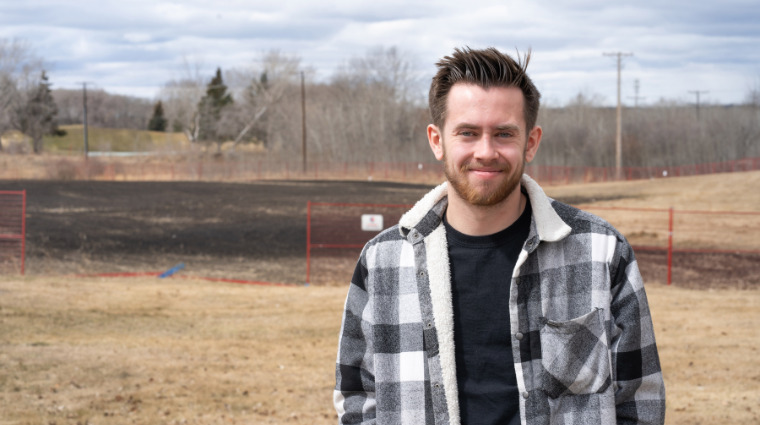
Tucker James has embraced hands-on learning and applied research by creating a pollinator garden as part of the Integrated Resource Management diploma program at Saskatchewan Polytechnic.
Last summer, James worked at Prince Albert National Park as part of the resource conservation team. Some of his colleagues who were vegetation specialists and Integrated Resource Management graduates knew James would have an upcoming applied research project as part of his studies. They suggested creating pollinator gardens might be a good future project, as they installed some in the park that summer. James loved the idea and decided to pursue it during the second year of his diploma program.
James pitched the idea to the City of Prince Albert, which resulted in a partnership. He received a 250-square-foot plot for his public garden from the Prince Albert Food Bank. The seeds needed to grow the garden were donated by Blazing Star Wildflower Seed Company of Aberdeen and the Native Plant Society of Saskatchewan. James is also hoping to source milkweed seed links from Meewasin Valley Authority.
“The main focus is creating a habitat that is beneficial to local native species such as butterflies, hummingbirds and moths,” James says of the garden.
“A pollinator garden is also a unique way to teach people about the native ecology in Saskatchewan, the importance of growing native plants and providing resources for species that may be at risk.”
James started growing seedlings inside his garage with heat lamps in March. Preparing these seedlings will ensure a quicker start to the garden this spring. As the Integrated Resource Management program wraps up, he looks forward to diving more into his applied research project. If all goes well with Saskatchewan’s weather, he hopes to start planting the pollinator garden in early June.
When asked what advice he has for other students interested in applied research, James replied: “You don’t have to be the best student. To be successful you need to work hard and be dedicated to your work. Hands-on experience outside of the classroom gives you more opportunity for employment, and it is a great way to meet people in industry . You will gain independence and, the more passionate you are, the more you’ll enjoy the experience. There are many ways to jump in, and there are several organizations that have the materials for you to use.”
This project has related to James’ studies as it focuses on native ecology and vegetation. Pollinator gardens are beneficial as they increase biodiversity, improve pollination and contribute to the sustainability of our environment. James is using what he learns through this project to improve his community.
Looking into the future, James plans to further his education at the University of Regina, majoring in environmental biology. An agreement between the post-secondary institutions allows graduates of Sask Polytech’s two-year Integrated Resource Management diploma program to transfer into the third year of the University of Regina’s four-year environmental biology degree to continue their education (2+2).
James’ biggest goal is to see his pollinator garden succeed.
“I’d like to thank my instructors, Joanne Marchand, Dave Halstead and Sask Polytech for providing me with this opportunity,” says James. “I really think it will benefit my future career path.”
Sask Polytech’s Integrated Resource Management provides students with a unique perspective on balancing the environmental, economic and social factors of natural resource development. The program emphasizes hands-on learning through labs, camps, field exercises and work experience.
Learn more at saskpolytech.ca/research.
Written by Rees Kachmarski, Sask Polytech student.

